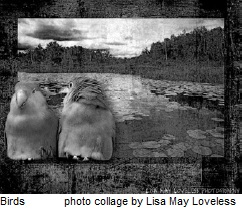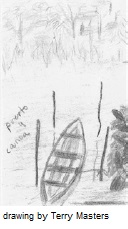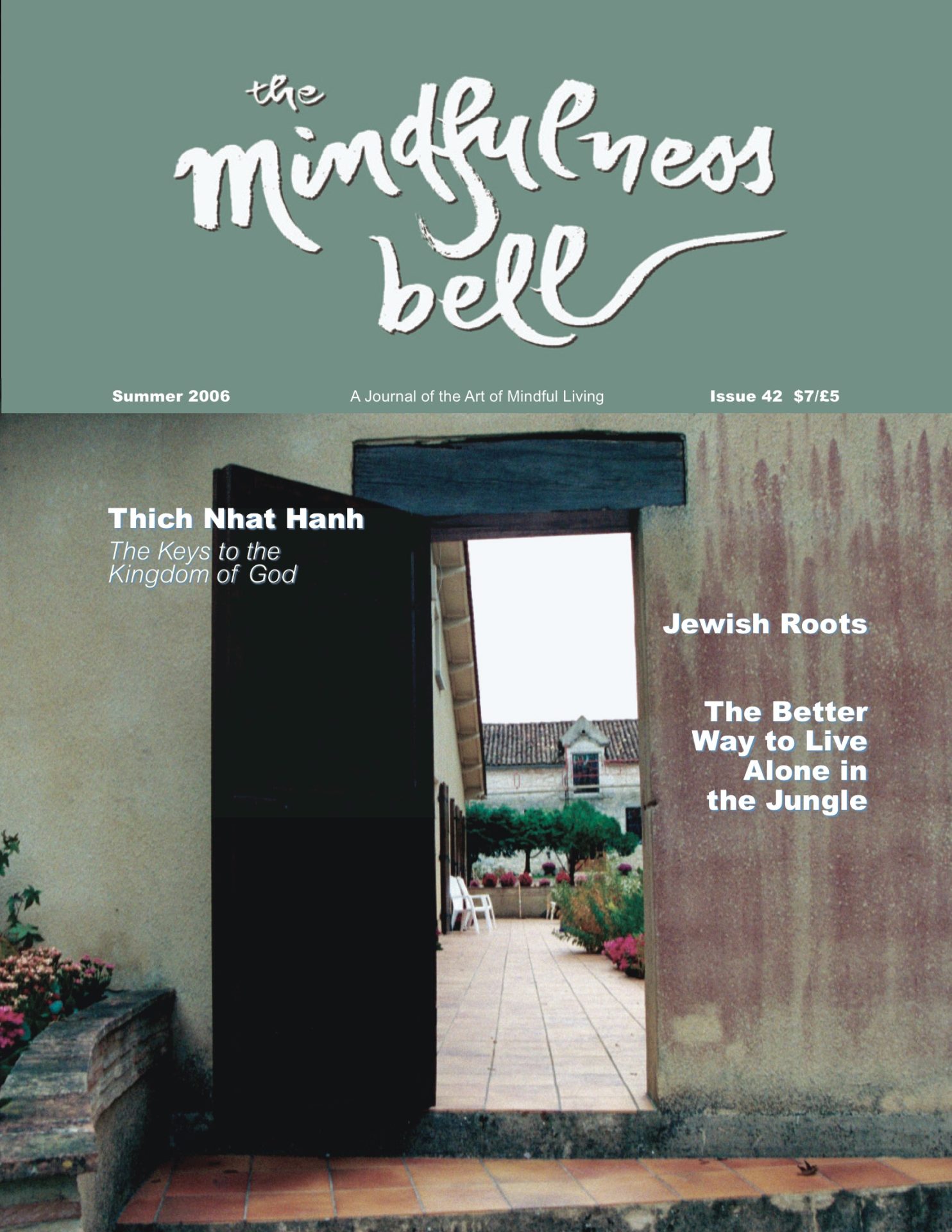
By Terry Masters
The Buddha taught:
“…I want to tell you that there is a wonderful way to be alone. It is the way of deep observation to see that the past no longer exists and the future has not yet come, and to dwell at ease in the present moment, free from desire. When a person lives in this way, she has no hesitation in her heart.

By Terry Masters
The Buddha taught:
“…I want to tell you that there is a wonderful way to be alone. It is the way of deep observation to see that the past no longer exists and the future has not yet come, and to dwell at ease in the present moment, free from desire. When a person lives in this way, she has no hesitation in her heart. She gives up all anxieties and regrets, lets go of all binding desires, and cuts the fetters which prevent her from being free. This is called ‘the better way to live alone.’There is no more wonderful way of being alone than this.”
from the “Elder Sutra”*
Last spring I lived alone deep in the jungle of Peru in a hut near the Amazon River. My hut sat on stilts and had screen walls, hand-hewn plank floors, and a thatched roof. There was no electricity so I had no refrigerator, no lights, no radio, no fan, no telephone. No washing machine, sink or toilet; no running water at all unless you count the Yanomono River which ran a few yards from my hut.
It was the Yanomono River that taught me the better way to live alone.
During the day I gave reading lessons to children in a little jungle library, and in exchange for my dinner, at night I taught English to the mozos—the guys who worked at the tourist lodge about forty minutes by dugout canoe from my hut.
The first evening, after working at the library, I gathered the supplies for my English class, put on my rubber boots, got my paddle, and walked through the jungle to the muddy riverbank where my dugout was tied to a tree root. I began paddling to the lodge just as the sun was setting. The river, and even the air around the river, was gold and pink, purple and orange and red. It is a wonderful thing to be in––not under, but inside––a sunset in the jungle in Peru.
I paddled slowly under a tree of sweet-smelling, lilac-colored flowers. Many of the flowers had fallen into the river, so I was gliding in golden, lavender-petaled water. The air was soft and warm and smelled green.
Women and men bathed on the riverbank. They smiled and waved at me as I passed.
“Hola Señorita!”
“Hola amigos!” I called back. “Buena noche, ¿no?”
As I paddled around a curve, naked children from the village swam out to play “Sharks Attack the Gringa.” They splashed me—as sharks will do when confronted with a gringa in a dugout canoe—and I cried out, “Ayudame! Ayudame!” (“Help me! Help me!”)—as gringas will do when confronted with a river full of ferocious fish.
When I arrived at the lodge, I was still smiling. I ate my dinner and gave an English lesson to my new Peruvian friends. At 9:00, when I was ready to paddle home, the darkness in the jungle was so thick that I could only see the top of my paddle and the front of my dugout canoe.
There was no moon. The stars filled the sky; a few were reflected in the river. I smiled, anticipating gliding back home through a dark peaceful river of silver starlight and purple flowers.
But as I left the lodge, I realized that although I could see the starry sky above and specks of starlight in the river, I could not see the riverbank, nor could I see where I was in the river. I peered into the darkness. I saw nothing.
My Peruvian friends had told me to stay in the middle of the river–– if I got too close to the bank, things in the trees could get into my canoe. I didn’t ask what things. I imagined them, though: fifty-foot anacondas, canoe-sized caiman, monkeys, bats, frogs, lizards, scorpions, tarantulas, snakes—I imagined every jungle critter known to man or woman jumping, flying, falling, crawling, or slithering into my canoe.
I got lost: the river “S”ed and I “Y”ed into a tangle of tree roots and vines. I had to paddle my way backward out of a little creek, back into the Yanomono again. I stared into the darkness trying to see where I was and what was around me. I saw nothing.
My heart began to race. I couldn’t get my breath. I began to paddle frantically through the river, bumping into the right bank, then the left.
A bat flew past, brushing my face with its wings. I squealed.
Mosquitoes buzzed my ears, bit my arms.
The sounds from the rainforest grew louder: frogs especially, but birds too, and other jungle animals I couldn’t name. I had to get home!
I peered anxiously into the darkness, trying to see what was out there, looking for the bank of mud in front of the path to my hut, looking for the tree root that was my port, looking for anything familiar. I could see nothing.
I passed under a low hanging branch and something fell from the tree into my hair. A tarantula! A huge tarantula! A huge hairy jungle tarantula!
I paddled fast, desperately slapping the water with my paddle. My arms, my shoulders, my whole body was tense. I gasped for a breath.
And then a voice from somewhere inside whispered, “Stop.”
I stopped. I took a slow breath.
I lifted my paddle from the water and let my canoe drift.
I stopped telling myself jungle stories. I stopped my Tarzan drama. I just stopped. Stopped and took a long slow breath.
Then another. And another. And another.
Finally, I forced a little smile.
“Hola, rio.” I whispered. Took a breath. Let it out.
“Buena noche, ¿no?”
The sounds of the jungle softened. The stars brightened. The river slowed.
I lifted my paddle and gently dipped it into the soft starsparkled river. I pulled it slowly through the calm waters.
Breathing in, I know that I am here, now. (Dip the paddle, pull the water, glide.) Breathing out, I know that I am now here. (No longer inventing scary jungle stories.) In…. here.
(Not thinking about the English lessons I just gave; not planning how to get up the muddy slope when I get home.)
Out….here. (Dip, pull, glide.)
Here in this present moment.
(New trees above me, new stars. New water below, new fish and mud and snakes. The air I now breathe is not the air of my last breath.)
Here in this wonderful moment. (Dip, pull, glide.)
After a while I saw some white tree trunks that looked familiar and dipping my paddle in, pulling back easily, I glided slowly toward them. I had arrived. I was home.
“Try living like that,” the Yanomono River said. “Thanks for the dharma talk,” I smiled.
The next day it rained most of the day. About an hour before sunset, when the rain had stopped, I took a small bucket to my canoe to bail out the rainwater. I also expected to bail out that huge tarantula that I had shook from my hair the night before.
There was no tarantula. In the rainwater, in the bottom of my dugout canoe, a small purple flower floated.
During the months I lived in the jungle, I became friends with the trees that lined the banks of the Yanomono River and familiar with its “S” turns. I came to know the sounds of the jungle and its smells. I recognized the reeds on the left that meant the river was going to wind to the right; the wide space overhead that meant I was to go straight; the cluster of white-barked trees that meant I was getting close to home; the hoarse frogs that meant I had arrived.
Aware that I was surrounded by friends—the river, the stars, the trees, the sounds, the smells—I was no longer so afraid. In fact, most of the time I was awed by the majesty—by the miracle—of it all.
It was the Yanomono River, deep in the jungle of Peru, that taught me The Better Way to Live Alone.

*The “Elder Sutra” as well as the “Discourse on Knowing the Better Way to Live Alone” can be found beginning on page 234 of The Plum Village Chanting and Recitation Book. Both are the subject of Our Appointment with Life by Thich Nhat Hanh, which also includes his beautiful commentary on them.
Terry Masters, True Action and Virtue, lives in Austin, Texas where she practices with the Plum Blossom Sangha. She has just returned from another month teaching English in the jungle of Peru.

